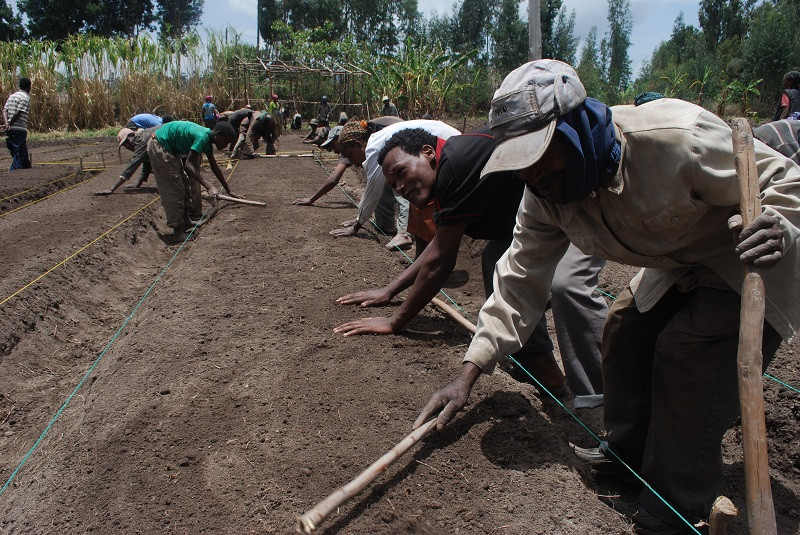People in Need Supporting Development of 12 Farming Training Centres in Ethiopia; Thus Help Thousands of Farmers
Published: Dec 19, 2013 Reading time: 4 minutes Share: Share an articlePrague, Addis Abeba (18th December 2013) – In the past few years, the Czech Development Agency and People in Need have supported eight farming centres in southern Ethiopia. These centres provide professional consultancy services to small-scale farmers on using modern techniques to extend the range of grown crops and to increase production of their fields. As the farmers obviously began to cultivate more crops in the fields and have not only increased their productivity but have also provided their families with a more diverse diet, the Czech Development Agency and the People in Need team will continue their support by establishing other 12 farming training centres in other districts of southern Ethiopia. These new centres will offer their services in a region inhabited by more than 19,000 farmer families.

Local branches of the Ministry of Agriculture provide land and purpose-built buildings for the farming centres, while People in Need (PIN) will, as in the past, supply the centres with furniture, farming tools or reference publications and train agricultural development agents, who will then share their knowledge with thousands of local farmers. “One of the main problems of Ethiopian agriculture lies in the farmers’ conservative approaches to land management. The centres’ staff are therefore teaching them how to cultivate new and varied crops, irrigate properly, use higher-quality seeds and fertilize effectively,” explains Jan Faltus, the coordinator of the Ethiopian projects, while adding that 36 trained agents will operate at the new centres.
#~gallery-826~#
Farmers can try to cultivate new crops, vegetables, feed, fruit, and mushroom or test modern practices of soil management on demonstration plots at the farming centres, where the training sessions are held regularly. Farmers can also borrow tools and store improved seeds at the centres. When studying the impact of farming centres with 216 farmers, it was revealed that they indeed employed the newly-acquired techniques at their farms, which directly influences their productivity. “As the farmers adhere to a proper spacing between crops, use appropriate fertilizers and pesticides or fertilize regularly, they tripled the yield per hectare of teff, maize, and beans,” says Challa Legesse, the local project manager of People in Need.
Farmers learnt how to cultivate lentils or apples
Together with the experts from the Czech Life Science University and local agricultural agents, it was also possible to cultivate wheat, lentils, potatoes, enset, apples or barley in new areas. This means that in the entire region, fewer inhabitants suffer from malnutrition, people consume more varied diet and famers can themselves cover the costs of the following farming season. Jan Faltus explains: “The farming centres are so successful because they are administered in close cooperation with governmental agricultural offices, which ensure their functioning in the future.”
The farming centres are also supported by the People in Need’s charity e-shop Real Gift that contributed two million Czech crowns in the last three years. The Avast Foundation has also donated 400,000 Czech crowns in the past two years. "Real gifts go to the poorest farmers’ families or we buy seeds, tools, and equipment for the centres and agricultural cooperatives. This year, we have newly supported beekeeping in a few centres," Jan Faltus says.
While supporting the 12 new centres, the PIN team will focus more on the quality and manner of information dissemination from agricultural agents towards local farmers. Small-scale nurseries for growing vegetables and tree seedlings will be established at the farming training centres. In addition to consultancy on crop cultivation, agents will also provide technical support in improved livestock breeding.
Moreover, three centres and three cooperatives will be chosen in a tender to gain financial support for the implementation of a processing technology based on their choice, such as the processing of pineapples or coffee. “The newly supported centres will also enrich their current know-how by collaborating with Czech agricultural entrepreneurs or agrarian experts,” says Jan Faltus, as he adds that the Czechs will primarily assist with beekeeping and economic consultancy. In the next three years, new tool banks and cultivated products will emerge at the centres, along with sanitary facilities or new water harvesting ponds.
People In Need and the Czech Development Agency will thus build on the successes from previous years in which dozens of agents were trained in sustainable management of the centres and in agricultural marketing. Moreover, two community seed banks, two grain mills, two potato stores, a poultry farm, a mushroom nursery, and an agricultural information centre were established, while the centres were supplied with 58 types of technical agricultural publications. All these changes significantly improved the quality of agricultural production on which the vast majority of rural Ethiopians entirely depend.
For more information please contact:
Jan Faltus, PIN Desk Officer for Ethiopia, +420 739 320 310, jan.faltus@clovekvtisni.cz
